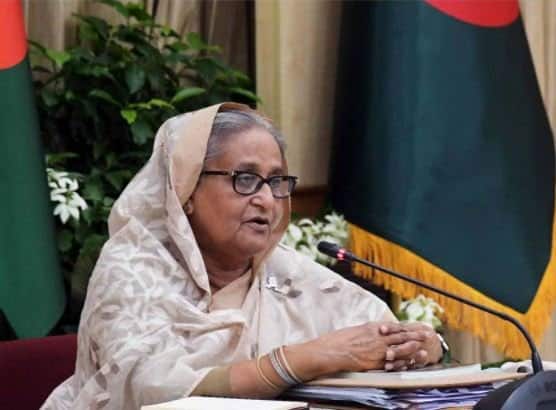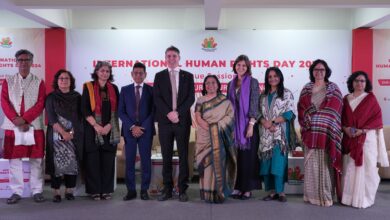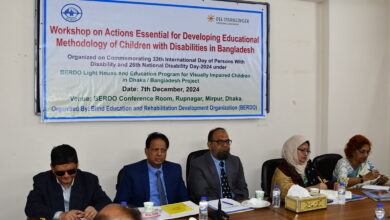PM for cleaner, greener & safer world

Terming the climate change, pandemic and destruction of nature as the common threats, Prime Minister Sheikh
Hasina has urged global leaders, businesses and G20 to work unitedly to get a common solution — a cleaner, greener, safer world.
Reiterating the steps for reducing global carbon emissions, she also called upon the world leaders to “turn pledges into action” to stave off the dire consequences of climate change.
“Climate change is a very different foe from those we faced, but dealing with it requires a great deal of fortitude, imagination, hope and leadership,” the PM said in her recent article published in the Financial Times, one of the world’s most esteemed newspapers in London, although it was purchased by Japan’s Nikkei Inc. in 2015.
She said: “In Bangla as we say: ‘Bhabia korio kaj, koria bhabio na’ (think before you do, don’t regret after you’re done) — We shouldn’t do anything that cannot be reversed.”
Focusing on Bangladesh’s efforts in the fight against climate change affects, the Bangladesh premier categorically called upon the global leaders to join her in fixing the global problem that “requires a
great deal of fortitude, imagination, hope and leadership”.
“If western leaders listen, engage and act decisively on what science demands of them, there is still time to make COP26 the success it desperately needs to be,” she mentioned in an article.
In the article, “We need a global ‘climate prosperity plan’ not empty pledges”, Hasina slammed the developed nations for not taking seriously the needs of those countries most immediately affected by
climate change.
“As the current president of the Climate Vulnerable Forum, Bangladesh is seeking more support from the international community and the G20 for increased finance and access to technology to speed
adaptation for those countries most at risk,” the article reads.
In that group, Bangladesh is one of the best prepared for extreme weather.”We are building sea walls, planting mangrove forests, embedding resilience in all governmental work,” she said.
“But we cannot walk this journey alone. Sixty-four countries and the EU have this week signed the Pledge for Nature to respond to the planetary emergency. They represent around 1.4bn people and one-quarter of global gross domestic product. From there, we need to build common political will at domestic and global level,” the article reads.
As hosts of the next COP, G7 and G20 meetings, the UK and Italy must drive this agenda, which requires a comprehensive support package for hardest hit nations, Hasina suggested.
“You may believe your bottom line is quarterly results. But our common bottom line is far more important: if nature is degraded to the extent it cannot protect us, we will all suffer. What happens in Bangladesh affects stocks in London and New York,” the PM wrote.
Showcasing on Bangladesh issue, Sheikh Hasina said, “Bangladesh was born 50 years ago this year, a birth shrouded in blood and pain. My father, Bangabandhu Sheikh Mujibur Rahman, inspired and led our
independence struggle. It is in his memory that we have named our climate prosperity plan the Mujib Plan.”
“The inconvenient truth of our times is that while action on climate change has never been more urgent and achievable, governments are not cutting emissions fast enough to keep nations such as mine safe,” she
wrote.
The premier said in the north of Bangladesh, millions depend on fresh water stored every year in the Himalayan ice fields, “which warming air is now destabilising”. In the south, sea level rise is exacerbating the threat from coastal flooding. Falling crop yields are another destructive change “we can anticipate”.
Only a tiny fraction of global warming can be attributed to Bangladesh’s carbon emissions, according to her.
“Even so, we are committed to leading the path to a solution. This is not only because we wish to avert the worst of climate change; it also makes economic sense. Investing in zero-carbon growth is the best way to create jobs across the economy and ensure that our nation becomes more prosperous.”
Earlier this year, Hasina said that her government cancelled plans for 10 coal-fired power plants but that was a relatively small step.
“Subsequently, with COP26 in view, we developed the world’s first national ‘climate prosperity plan’ – a vision under which we will enhance resilience, grow our economy, create jobs and expand opportunities for our citizens, using action on climate change as the catalyst,” she said.
Under the plan, the premier said, they will obtain 30 percent of energy from renewables by the end of the decade.
“We believe that developing wind farms along the coast will revitalise the mangrove forests that help stabilise our shifting shores, protecting against storms and flooding. We will empower banks to offer favourable terms to fossil fuel-free infrastructure projects, and pursue co-operation with developed nations in areas such as green
hydrogen,” she wrote.
“By investing in resilience and zero-carbon development, we will create about 4.1m more jobs this decade than under business-as-usual.
“The plan will simultaneously prevent up to 6.8 per cent of the economic damage that would otherwise come not only from climate change but also increasingly uneconomic fossil fuel infrastructure.
“We calculate the benefit to our GDP at over $850bn. I believe more developing nations will adopt such plans in the coming months and years, led by members of the Climate Vulnerable Forum,” Hasina wrote.
Bangladesh can implement this plan independent of other countries, although international climate finance would speed things along. “But what the world needs if they are to meet the Paris agreement goal to keep warming to less than 1.5C above pre-industrial levels, is a global version of our climate prosperity plan,” she claimed.
“This year’s COP26 summit in Glasgow is the best opportunity we will ever have to make one,” the premier mentioned, adding that as things stand, failure is a distinct possibility.
Hasina said: “Having pledged three decades ago at the Rio Earth Summit to lead the world out of the climate and nature crises, developed nations have cut their combined greenhouse gas emissions by less than one-seventh. That is not leadership.
“Although recent net zero pledges from the EU, US and others are welcome, they are largely not accompanied by policies that give confidence that they will be delivered. The $100bn per year finance pledge made 12 years ago remains unfulfilled,” she mentioned in her article.
However, according to the PM, this $100bn is tiny compared with what developing nations will need in order to build a zero-carbon “Both governments and private institutions want to invest but we face the stark burden of a high cost of capital, exacerbated now by Covid-related debt.
“If developed nations wish to help they must address this. Cutting the cost of capital will substantially accelerate decarbonisation across the global south, yielding worldwide benefits,” she wrote.
If western leaders cannot see the logic of this, Hasina said, “Perhaps recent events in their own backyards will help – for what were the extreme forest fires seen in North America and Australia or Germany’s recent lethal floods, if not alarm bells clanging in regions of the world most responsible for climate change?”
She said a recent analysis by Vivid Economics of the response to Covid-19 suggests that its impact on climate change has been mixed. “I salute the EU for prioritising a green recovery.”
“We plan to do the same in Bangladesh, and I fervently hope my fellow government leaders as well as business leaders will as well. Jobs must be a priority, but so too are the jobs of the future and building solid foundations for decades to come,” reads the article.





